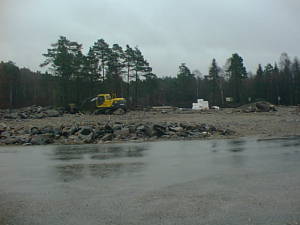Thursday 11 January 2001

|
Pic of the day: In globalized countries, economic growth is considered the natural state of things. Here, the groundwork is laid for a clutch of new houses a ten minutes walk from the Chaos Node, a few days ago. Yay globalization!
"No longer a solid or liquid, we have become as a vapor ...
And like a gas, we shall not be easily contained." Yes, once again the words of the fictional fundamentalist leader from Alpha Centauri rang out in my mind, as I read about the new Globalization Index from A.T.Kearney and Foreign Policy Magazine. Somewhat surprisingly, Norway was only the world's 9th most international nation, beaten by Singapore, the Netherlands, Sweden, Switzerland, Finland, Ireland, Austria and United Kingdom. On the bright side, we beat Canada, Denmark and the United States, not to mention all the rest. Yay globalization! More than just the best researched ranking ever of the international engagement of nations, the study also looks into the common traits shared by highly internationalized countries. These traits are, as can be expected, the exact opposite of what socialists would predict. Globalized countries are more egalitarian, less corrupt, and with more secure human rights. Really, this is only logical: The citizens are well informed about the world and are also able to vote with their feet. Would you remain in poverty in a corrupt and inhumane country if you could just go elsewhere? ... we shall not be easily contained. ***SuperWoman mailed me. She considers working her compulsory year in Denmark rather than Norway. That's fine by me, since Denmark is closer than most of Norway. The main problem with Denmark is that the Danish make strange grunting noises instead of speaking, even though their written language is similar to ours. Apart from that, it will certainly be an improvement from Germany, where she has been studying so far. In March, she's going to New York to visit her sister, the incredible Cutie, who is trying to take another few months of "vacation" with a family there. ... we shall not be easily contained. ***I myself am not much of a traveller, inside Norway or outside. I've actually never been outside Norway, then again I have never been to northern Norway either. I usually travel only when I am physically needed in some place, or when I can get a hug. (OK, that joke was not up to my standards of professional detachment.) Anyway, I still probably read (and write) more English than Norwegian during a normal day. Many of the people I interact with regularly are foreigners: Americans mostly, but also disproportionally many Dutch and some Brits, Australians and assorted others. Some of them I don't know the nationality of, and with some it doesn't matter. But certainly it must be a good thing that the lines on the map don't mean so much to us any longer. Why should we be divided according to the conquests in bed or battle of kings that are dead long ago? It has lasted more than long enough as is. It is one world, and it is ours. ... we shall not be easily contained. ***Globalization is not just for American multinationals anymore. As communications get gradually better, it becomes easier to import and export goods and services. When the guy from Coca-Cola Company is the only white man you have ever seen, you may be tempted to sell things cheaper than if you know there is a whole world out there. The solution to exploitation in the third world is not to break shop windows and plunder the shops, like protesters against world trade did last year. The solution is to further improve communications. It does not make sense to give Internet to people who don't have food; but the boundaries should be pushed ever forward. We know that humans are geared toward communication by nature. If there is just one radio in the village, people will gather about it, and go on to tell others what they heard there. (I am actually old enough to remember when this happened with television, and my parents saw it with telephone.) The same is bound to happen with the Internet. It need not be the Internet, either. All communication helps. Even a narrow road here and a bridge there, bringing together two villages. A narrow gravel road and a few old bicycles is a revolution when there has only been jungle for ten thousand years. Elsewhere, between two towns, a broader cemented road is finished, and cars start to travel back and forth. Elsewhere, between two larger cities a railroad is built. In some remote African village, people gather around their first telephone, like our grandparents did (or great-grandparents for the younger readers). In a Norwegian home, a 12 year old girl gets her first mobile phone that is all her own. Somewhere in India, the first shopkeeper in a small town gets internet access. Somewhere in Bergen, Norway, a family upgrades their Internet connection from ISDN to ADSL. It's all different, and all the same. The need to communicate is a basic human trait. ... we shall not be easily contained. |
Bonus today! A game journal page! Meet my Gifted Simsters in DJ's Day. Another fine day, but cold. |
Yesterday <-- This month --> Tomorrow?
One year ago
Two years ago